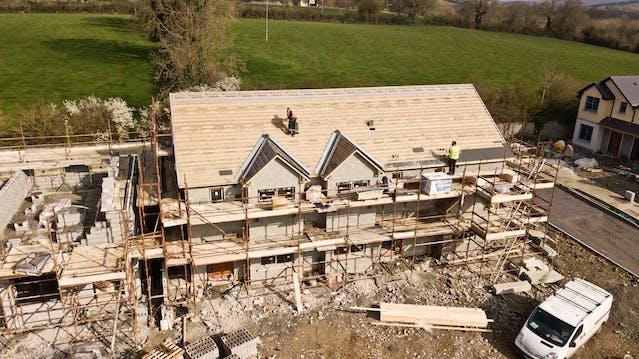It's crucial to ensure your home insurance aligns with your needs to prevent unexpected setbacks during a claim. Inadequate coverage may cause financial strain, while excessive coverage isn't optimal either
So, how can you determine if your home insurance meets your needs? Here are some points to consider.
What is overinsurance?
Simply put, overinsurance occurs when your insurance coverage exceeds what you truly need. Essentially, it means your policy provides more coverage than the value of your belongings warrants.
Overinsurance can be categorized into two types:
-
In good faith: This happens unintentionally when the declared value exceeds the actual value of your possessions.
-
Fraudulent: In this scenario, the difference between declared and actual value is intentional and deceitful.

What is underinsurance?
Underinsurance occurs when the insurance coverage acquired is insufficient for your needs. In such cases, the policy's amount doesn't fully cover the value of the property or its reconstruction.
Underinsurance frequently stems from a desire to lower premium costs. However, opting for insufficient coverage can lead to significant financial consequences when filing a claim.
The consequences of being under- or over- insured
When coverage is excessive, the insured face the risk of paying unnecessarily high insurance premiums. Since premiums are partly based on the coverage amount, being overinsured leads to increased costs without proportional benefits. Despite the higher payments, the insurer will only compensate for the actual value of the damaged, lost, or stolen goods, not the inflated value.
On the other hand, an inadequate insurance policy can lead to significant financial repercussions for the policyholder. This shortfall becomes apparent during a claim, where the limitations of the coverage are revealed.
According to the Civil Code of Quebec, the insurer must pay up only to the specified amount in the contract. Consequently, if the insurance coverage falls short of covering all expenses in the event of substantial damage, the policyholder is left to bridge the gap themselves. This means they must personally cover any costs exceeding the coverage limit, potentially leading to financial strain or hardship.

The principle of proportionality
Being underinsured can have financial consequences not only in the case of total loss but also in smaller claims. According to the law, a principle of proportionality applies in the case of partial losses.
Practically, this means that to receive indemnity covering the total damage of a partial loss, you must have chosen an insurance amount equal to the value of the insured property.
Let's suppose your home’s roof sustains storm damage estimated at $35,000. To receive full compensation, you should have been insured for $425,000. However, your policy states coverage of only $365,000.
Because you're underinsured, your insurer can apply the principle of proportionality. Consequently, they pay you only $30,000, leaving you to cover the remaining $5,000 for the roof repair.
It's worth noting that some insurance contracts may include a more lenient proportional indemnity clause than what's outlined in the Civil Code of Quebec. In such cases, the required insurance amount to obtain full compensation might be lower, typically around 80% of the value of the insured property.
Reconstruction value: the best way to adjust your coverage
How can you avoid being over- or under- insured? Ensuring adequate coverage for your home insurance begins by accurately estimating the reconstruction value of your property. This ensures that in the event of a total loss, you'll have sufficient coverage to rebuild your home to its original condition.
Additionally, it's essential to conduct a comprehensive inventory of your belongings before acquiring a home insurance policy. This step provides an accurate understanding of your assets and their replacement costs, helping you determine the appropriate coverage you need.
If you're uncertain about your insurance needs, seek advice from a certified damage insurance broker. They can provide personalized guidance tailored to your situation and assist you in selecting the appropriate insurance coverage.

How do you assess the reconstruction value of your home?
While insurance brokers can offer guidance on coverage amounts, accurately assessing your home's reconstruction value requires specialized expertise. For a reliable estimate, it's best to enlist the services of a certified appraiser.
Remember, the insurance amount you choose should cover not only the cost of reconstruction but also associated expenses such as demolition, labour, and property replacement or repair. It’s essential to consider all these factors comprehensively when determining your coverage needs.
Updating your policy: an essential step!
If you've had your insurance contract for several years, it's important to recognize that your coverage needs may have evolved over time. Despite initially accurately assessing your coverage requirements, various factors such as fluctuations in the real estate market and renovations to your property can impact your home's value.
As the value of your home increases, it's essential to adjust your home insurance coverage accordingly. Contract renewal offers the perfect opportunity to review and update your coverage. This ensures that your policy stays in sync with your changing needs and prevents the risk of being underinsured. Regularly updating your coverage is the most effective way to safeguard your assets adequately.
Are you looking for a home insurance policy?
XpertSource.com can help you find the home insurance that fits you. When you tell us about your project, we put you in touch with qualified resources for free. Simply fill out our form ( it only takes a few minutes ) and we will connect you with professionals.

